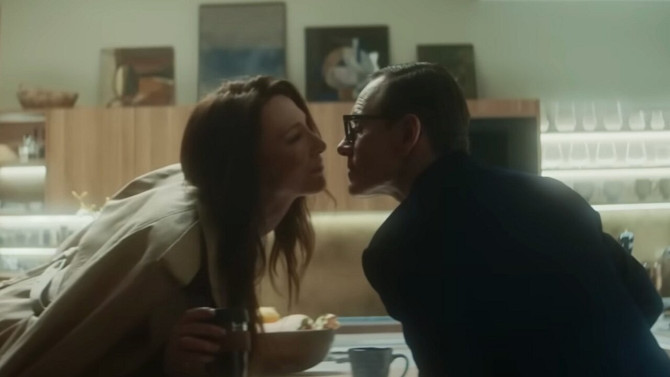
An Attaché Case
In 2025, dare I say that it’s nice to be highlighting a film made for mature audiences. Avoiding the pratfalls of sequels, remakes, comic book movies, and overly costly bombast, Black Bag, written by David Koepp (Mission: Impossible) and directed by Steven Soderbergh (Traffic), is most easily described as an old school spycraft feature. Opening with an extended tracking shot of spy George Woodhouse (Michael Fassbender) making his way through a happening nightclub in London, his contact soon informs him that there is a rat leaking some sort of tech software named Severus from within the agency. If there is one thing Woodhouse despises, it’s a liar, so he invites all of the suspects to a dinner party to try to get to the bottom of it.
-
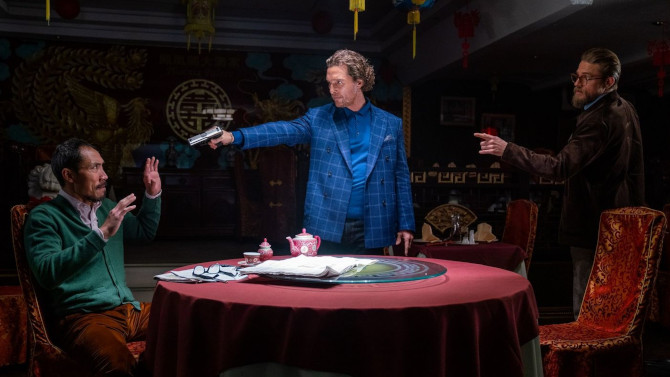
Ritchie Rich
The GentlemenFebruary 19, 2021A return to his roots after more than a decade making big budget studio pictures, Guy Ritchie’s The Gentlemen (2019), recaptures that unique mixture of crime and comedy (all done in a hyper-stylized visual way) that put him on the map back in 1998 with Lock, Stock and Two Smoking Barrels (the successful follow up Snatch would come in 2000). If you don’t like Ritchie’s visual style and Limey-centred crime stories, then this likely won’t win you over, but if you’ve missed his unique method of film making since his last gangster flick (2008's RocknRolla), this one should feel as comfortable as a finely made bespoke suit.
-
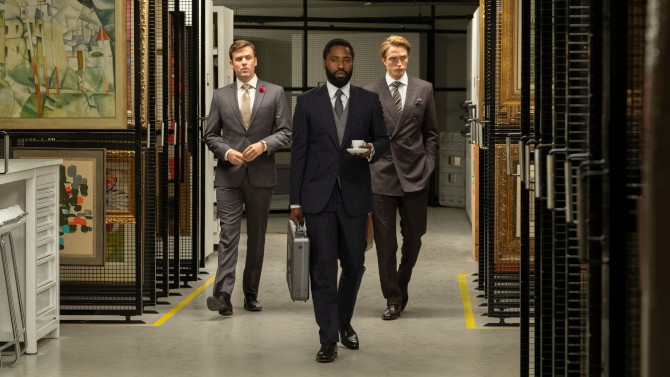
Turning Back Time
TenetAugust 30, 2020A title with so many connotations – of course, it speaks to the fascinating time tinkering found in Christopher Nolan’s new film Tenet, but it also refers to a pre-Covid time. . . a place where people nonchalantly made the trek to movie theatres where packed crowds would communally enjoy the newest blockbusters. Whether Tenet will be able to turn back time and safely fill cinemas during this new normal is yet to be seen. A mesmeric and visually stunning spectacle that finds Nolan playing within his favourite themes, Tenet is clearly self-indulgent, yet not to its own detriment. Following up works like Memento, The Prestige, Inception, Interstellar, and, to a lesser degree, Dunkirk, Tenet, for lack of a better description, is a sort of password. . . an entry by fire into a small group of people who are attempting to prevent World War III. It is a CIA agent simply known as The Protagonist (John David Washington – BlacKkKlansman), who is introduced into this precarious, mind-bending new world.
-
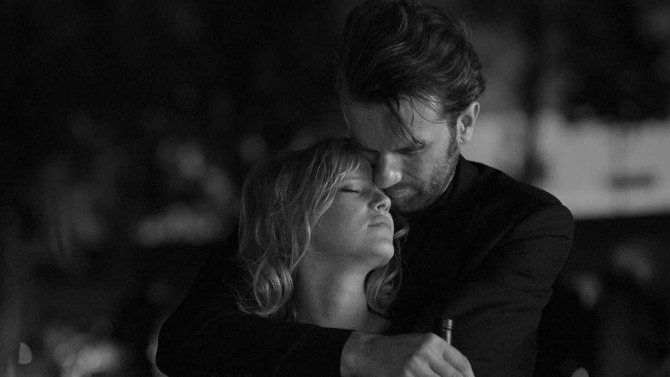
Some Like It Cold
Cold WarApril 26, 2020It is likely that any other year, outside of 2018, would have meant that a second one of Pawel Pawlikowski’s films would have won Best Foreign Language Film at the Academy Awards (the other is 2013's Ida). Instead, Alfonso Cuarón’s Roma (in its own right, a truly visionary film) froze out Cold War. Though this Polish export did achieve a nomination in the above mentioned category, as well as receive nods for Best Achievement in Directing and Best Achievement in Cinematography, it, in many ways, got overshadowed by another black and white foreign film released the exact same year. . . which is truly a shame. Set in post-war Poland – 1949, to be exact, Wiktor (Tomasz Kot), a very bourgeoisie musician (a dynamo who can play the piano, as well as write and arrange music) – bold, confident, and gifted, tours the countryside, recruiting the most talented teens and twenty somethings for a folk music ensemble that will tour Poland and the rest of the Eastern Bloc. One of the finds, Zula (Joanna Kulig), an undaunted singer, may not be the most pure talent, though she has that certain ‘je ne sais quoi’. With a mystifying persona, she is spark plug, femme fatale (both director and actress inspired by Lauren Bacall and her sarcastic delivery), and, somehow, ingénue. Wiktor has found his muse. . . love at first sight. . . the genesis of a change that you can never return from. A love affair blossoms.
-
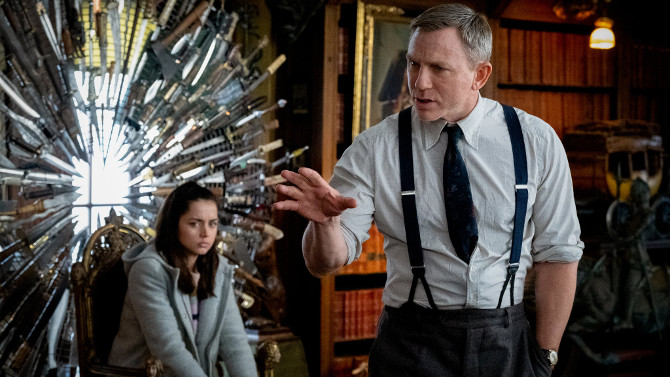
Blanc Check
Knives OutApril 6, 2020An Americanized twist on the Agatha Christie murder mystery, Rian Johnson writes and directs Knives Out (2019), an entertaining crime-centric dramedy that earned him an Academy Award nomination for Best Original Screenplay. Centred on the suicide (or is it murder – cue the dramatic music) of famed crime writer and patriarch Harlan Thrombey (Christopher Plummer), he was the centre (and benefactor) of his entire family. Though this is the genesis event, the main player is actually his kind-hearted and thoughtful caretaker/nurse, Marta Cabrera (Ana de Armas) – someone who is constantly reminded by Harlan’s relatives that she is a part of the family (despite them claiming she is from Ecuador, Cuba, Uruguay, Paraguay and Brazil – definitely part of the family). With a really weird disorder, she vomits anytime she attempts to lie – not good in a murder mystery.
-
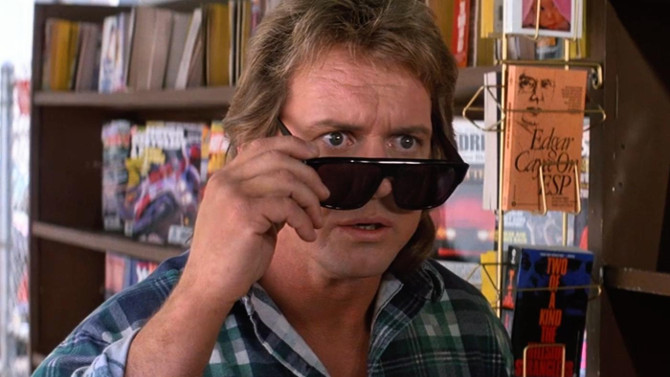
Control Freak
They LiveJune 30, 2019Let’s face it, some movies don’t age too well, but if they’ve got the three main ingredients – solid writing, visuals, and acting, usually they can stand the test of time. One film that is still as timely today as it was back in 1988 is John Carpenter’s horror tinged sci-fi action film They Live. Welcome to Reagan era America, all trickle down economics, high unemployment rates and rising poverty. Set in ‘any city’ USA, Nada (Roddy Piper) is an out of work drifter looking for a semblance of the American dream. . . a job would be a start. Finally finding some employ on a construction site, fellow hard worker Frank (Keith David) takes him to a sort of shantytown, where the long travelling man can find a warm meal and a night’s rest.
-
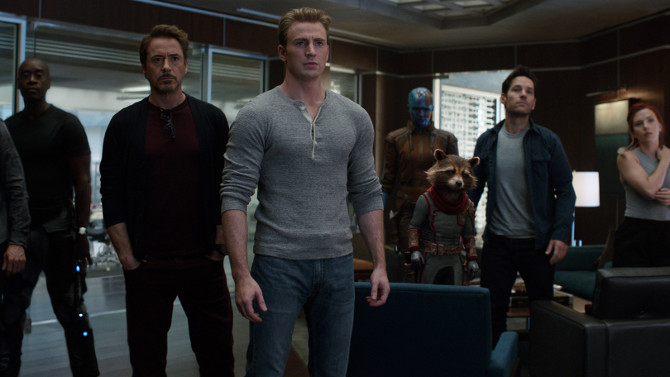
‘Marvel’ous
Avengers: EndgameMay 7, 2019Every once in a while, a film becomes part of the zeitgeist – capturing the spirit and mood of its time, uniting viewers in a shared experience that will never be forgotten. Think Gone With the Wind, Casablanca, The Godfather, Jaws, Star Wars, Titanic, the Lord of the Rings trilogy, Avatar. . . you get the idea. Capturing lightening in a bottle, this shared experience unites moviegoers worldwide, the most recent example, Avengers: Endgame (2019). Whether you love comic book films or hate them, it is hard to argue with what Marvel has done since 2008 (starting with Iron Man). A three phase initiative, with almost too many superheros to name, Endgame is the twenty-second feature in the last eleven years, and, in many ways, the end of this unique vision. Something never done before, standalone and ensemble films have been combined to great effect, grossing (to this point) over twenty billion dollars, and, for the most part, winning critics over along the way.
